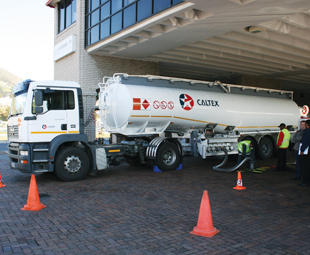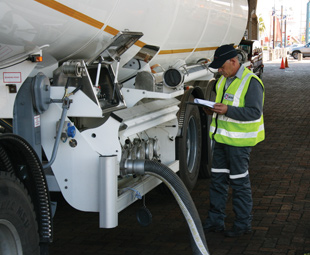Safety first!

Chevron South Africa, the supplier and distributor of Caltex fuels and lubricants, has made dramatic improvements to its professional driver standards over the past six years.
According to Eric Stuttaford, transportation safety specialist at Chevron, the previous system of hiring drivers through labour brokers made managing and motivating drivers difficult. This system is no longer in place and Chevron employs drivers directly as full-time “Chevron professional drivers”. The company has created a remuneration and reward package that aligns drivers’ personal objectives with that of the company.
Chevron’s Transportation Safety and Training Department manages a rigorous driver recruitment process, and only those who meet the high standards set by Chevron are employed as professional drivers. All drivers participate in rigorous induction training sessions and are given an in-depth introduction to Chevron’s guiding principles and tenets as set out in “The Chevron Way”. “Drivers receive a set of training modules that shows them how to handle petroleum products safely and efficiently. An innovative driver performance monitoring and reporting programme using DigiCore’s C-track Solo product, provides daily, weekly and monthly reports on driver performance against set criteria,” Stuttaford tells FOCUS.
There are many levels at which a driver’s performance is measured and Chevron has structured an innovative incentive package that rewards excellent performance. About 40% of the incentive package is based on how well drivers comply with set criteria on speeding, engine rev control and harsh braking. Compliant driving results in a high percentage score that translates into high incentive pay, and vice versa. “To empower drivers with the skills to reach top vehicle monitoring scores, the USA-based SMITH System of Defensive Driving is used as the company standard, and a number of experienced driver training specialists are appointed to train drivers on the SMITH system,” reveals Stuttaford.
All drivers are afforded the opportunity to enhance their education and qualifications by completing the SAQA accredited National Certificate in Professional Driving (NCPD). Part of their incentive package is based on their achievement of the NCPD certification.
Chevron utilises the Loss Prevention System (LPS) and Incident Prevention System (IPS) to manage, assess and monitor employee behaviour, and to investigate and report incidents. “The LPS and IPS systems enable drivers to understand and assess the risks involved in carrying out their duties, and allow the company to assess driver behaviour in a non-threatening manner. These systems are also used to incentivise drivers. If a professional driver completes a full month of work without causing a loss incident of any kind, (typically, an injury, a product spill, a product misdirect or a motor vehicle crash), the driver earns another portion of incentive pay,” Stuttaford explains.
 The company regularly compiles a competence/commitment matrix describing best, worst and average performance. This challenges drivers to become fully competent and fully committed to working safely. All Chevron employees are issued with “Stop Work Authority” (SWA) cards that allow them to stop any work that they deem to be unsafe and no-one is allowed to overrule the SWA cards.
The company regularly compiles a competence/commitment matrix describing best, worst and average performance. This challenges drivers to become fully competent and fully committed to working safely. All Chevron employees are issued with “Stop Work Authority” (SWA) cards that allow them to stop any work that they deem to be unsafe and no-one is allowed to overrule the SWA cards.
These and other measures have made an enormous improvement in Chevron’s safety record. “The Early Injury Management Programme that manages all reported workplace injuries has recorded over 900 consecutive ‘lost time injury free’ days amongst Chevron’s professional drivers, and over 240 consecutive days without a recordable or serious motor vehicle crash. The severity of motor vehicle crashes has decreased dramatically, bringing down the accident repair costs with it. It was found that in most cases, the crashes were caused by third party drivers, thereby enabling the company to recover the costs from their insurers,” reveals Stuttaford.
“The most meaningful result of the safety measures is that our professional drivers are able to go home at the end of their shifts as fit and well as when they came to work,” says Stuttaford. “In 2009 the company paid out almost R2 million in incentive pay, and Chevron trucks spent more time delivering fuel and less time having accident repairs done to them. Motor vehicle safety at Chevron is an area where everybody wins and we are justly proud of our improved performance.”
And so they should be!
JV for Cargo Carriers
Cargo Carriers has secured a 50-50 equity deal with Caltex Eastern Cape Marketer (CECM) to establish a new transportation business named Khanya Carriers (Khanya means to shine) for the distribution of Caltex fuels and lubricants into the rural Eastern Cape.
CECM was established after concluding a deal with Chevron for the transport and distribution of all fuels and lubricants throughout the rural Eastern Cape in December 2005. Initially the company delivered fuel to 35 Caltex service stations and relied on existing Chevron transporters as well as third party service providers, for their distribution.
For a number of reasons, CECM needed to redefine and optimise its transport solutions in the way the company distributed its fuel and lubricants: CECM had increased its footprint in the Eastern Cape to 46 service stations and Chevron had intensified focus and guidance for higher Safety, Health, Environment and Quality (SHEQ) standards. Wanting more control over the transportation function, it needed to find a partner with the highest SHEQ standards, fuel transport experience and proven reliability, and as importantly in these uncertain times, a strong balance sheet.
“We did not want to simply contract out our last mile distribution; we wanted to form a partnership with a company who would be with us for the long haul, and would be committed to achieving long-term growth. Some of the non-negotiable factors in selecting a company to enter into a partnership with were a high SHEQ score, a national footprint, and uncompromising reliability and integrity,” says CECM director, Clive Berlyn.
“Not only does Cargo Carriers have a solid track record in the handling and distribution of fuel in remote areas and superbly high SHEQ scores – which are imperative when dealing with hazardous materials – the level of technical expertise and integrity of their staff is exceptional,” concludes Berlyn.
Published by
Focus on Transport
focusmagsa




